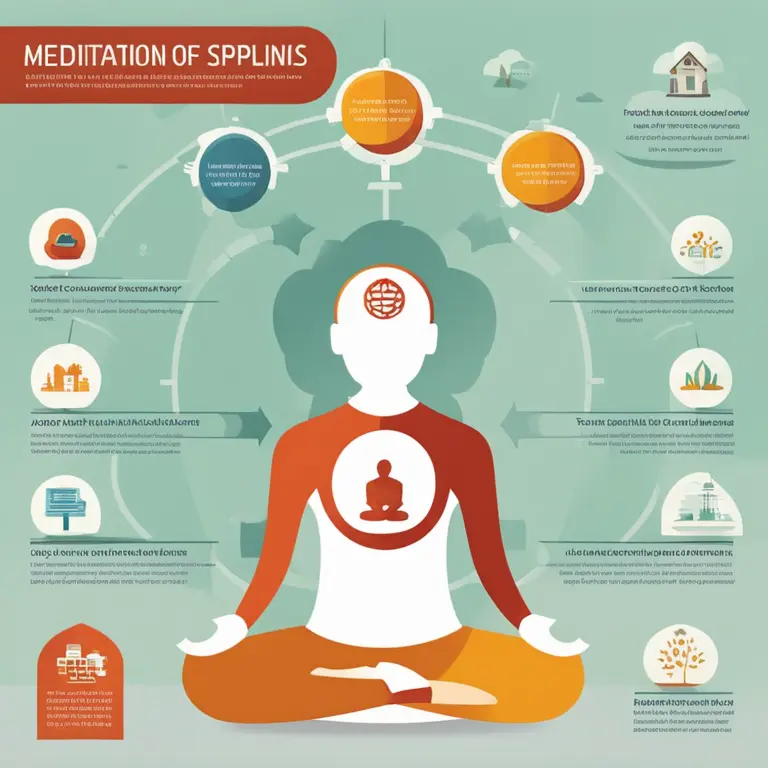
Meditation & Its Role in Managing ADHD Symptoms
Delve into the benefits of meditation for ADHD management, exploring how mindful practices can aid focus and reduce symptoms.
article by Hina Kurosawa
Mindfulness and ADHD: A Primer
As our world becomes ever more hectic and stimulus-rich, the challenge of focusing attention and maintaining concentration, especially for individuals with Attention Deficit Hyperactivity Disorder (ADHD), grows increasingly arduous. While traditional treatments for ADHD often involve medication and therapy, the practice of meditation is emerging as an effective complementary approach. This form of mental exercise emphasizes the cultivation of a heightened state of awareness and focused attention. Nowadays, healthcare professionals are recognizing the virtues of this holistic practice when included as part of a broader, integrated treatment plan for ADHD.

The Science behind Meditation and ADHD
Recent studies have illuminated the potential pathways through which meditation can alleviate ADHD symptoms. By engaging in regular meditation, individuals may experience improvements in executive function, working memory, and reduced impulsivity – core difficulties faced by those with ADHD. Neural imaging has shown that consistent meditation can lead to changes in brain patterns, boosting areas associated with self-regulation and focus while downregulating those involved in mind-wandering and hyperactivity.

Techniques to Get Started with Meditation
For those with ADHD, beginning a meditation practice can seem daunting due to the inherent difficulty they face in maintaining stillness and concentration. Starting with short, guided sessions can make the process more approachable. Techniques such as focused attention meditation, where the individual centers their attention on a single point like the breath or a mantra, can introduce structure to the practice. Mindfulness meditation, which involves observing thoughts and sensations without judgment, can also be beneficial, as it trains the mind to return focus without self-criticism.

Meditation as a Daily Routine for ADHD
To reap the benefits of meditation for ADHD, consistency is key. Integrating meditation into the daily routine can help create a pattern that enhances its efficacy. Even just a few minutes each day can be advantageous. Smartphone apps and online resources catered to ADHD-friendly meditation can assist individuals in establishing and maintaining a regular practice, ensuring meditation becomes an accessible and sustaining part of their daily lives.

Considerations and Limitations
While meditation has shown promising results, it is not a standalone cure for ADHD. It is crucial to consider it as a complementary treatment rather than a replacement for conventional therapies and medications. Additionally, meditation may not be suitable for everyone, and individuals should consult with their healthcare provider before making any significant changes to their treatment regimen. Acknowledging meditation's role within a wider framework of ADHD management strategies is essential for setting realistic expectations and goals.
Conclusion and Future Outlook
The intersection of meditation and ADHD treatment is an evolving landscape, with ongoing research continuing to expand our understanding of its benefits and applications. As we push forward into 2024 and beyond, the integration of technology with meditation, such as biofeedback and virtual reality, could offer even more tailored and effective approaches for individuals with ADHD. By embracing meditation, those affected by ADHD may find a powerful ally in their journey towards improved mental health and quality of life.
Published: 1/15/2024
Modified: 1/15/2024
More predictions
Come back here soon to learn more about yourself and your future


Calming the Storm: Mindfulness Meditation for Anger
Discover how mindfulness meditation can be a powerful tool for anger management, promoting inner peace and emotional balance.


Mindfulness Meditation: A Handbook for High Schoolers
Discover how mindfulness meditation can benefit high school students, enhancing focus, reducing stress, and promoting overall well-being.


Discovering Life with Meditation Mantras
Delve into the transformative power of meditation mantras to harmonize your mind, body, and spirit for a tranquil existence.